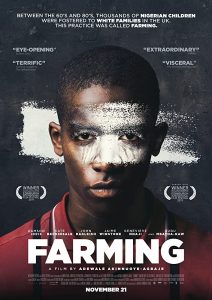IT’S so annoying when a film gets almost everything right.
The English drama Farming is skillfully made, visually arresting, well-acted and moving, but it wraps up too damned quickly.
After 90 minutes of well-paced events that have built an emotional connection to the main character, despite his moments of shocking violent behavior, debut writer/director Adewale Akinnuoye-Agbaje rushes through his finale.
It’s doubly disappointing, and a little bewildering, because this is a film based on real events in his own life as a Nigerian immigrant growing up in England during the 1960s and 70s.
His alter-ego Enitan is amongst a family of poor Nigerians who are ‘farmed out’ by their parents to a white British family, a practice that actually occurred over a couple of decades.
It was a confusing move doomed to longer-term failure for all, particularly the children who grew up torn between two worlds and cultures and ultimately, like Enitan, not feeling they truly belonged to either or anyone.
Instead of a better future with a loving family, Enitan becomes an outside, ostracized by all until he finds some form of strange solace with the white skinhead gangs he sees on the streets, defying authority and forging their own identity and sense of twisted cohesion.
Enitan rises to become a feared leader of the group, even terrorizing other black people, including a kind teacher who tries to empathise with him.
Damson Idris is exceptionally good in the lead role. There is strong support from Kate Beckinsale, almost unrecognizable as the tough, street-wise mother raising a horde of foster kids for financial gain, and Gugu Mbatha-Raw as the teacher Ms Dapo.
Farming is a tough, uncompromising film – you won’t soon forget the young Enitan’s tortured attempts to scrape his black skin off – and well worth a watch.
It’s just unfortunate that the final act lacks cohesion.
